In the afternoon of November 5, 2019, an interdisciplinary seminar co-sponsored by School of Information Management, Wuhan University, Center for Studies of Information Resources, Wuhan University, editorial department of Documentation, Information & Knowledge (in Chinese) and editorial department of Journal of Information Resources Management (in Chinese) was held in meeting room 313 of School of Information Management.
The theme of the symposium was "Flow of Scientific Researchers and Its Influence". Professor Jiang Li at School of Information Management, Nanjing University, special associate research fellow Dongbo Shi at School of International and Public Affairs, Shanghai Jiao Tong University, Professor Zhilei Shi at School of Public Administration, Zhongnan University of Economics and Law, Professor Zhi Luo at Economics and Management School, Wuhan University, and four postgraduates from Nanjing University and Shanghai Jiao Tong University discussed about the reasons and characteristics of scientific researchers' flow worldwide and descriptive inference and causal inference methods in quantitative analysis. Professor Chuanfu Chen, dean of Graduate School of Wuhan University and editor-in-chief of Documentation, Information & Knowledge (in Chinese) participated in the seminar. Moreover, about 40 teachers and students from Wuhan University, Central China Normal University and Wuhan University of Science and Technology attended at the seminar.
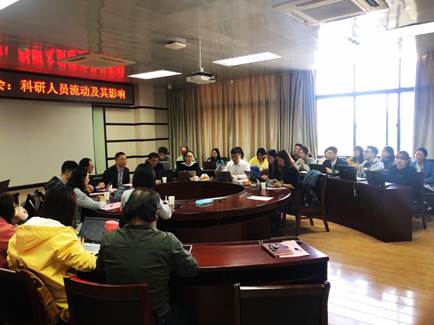
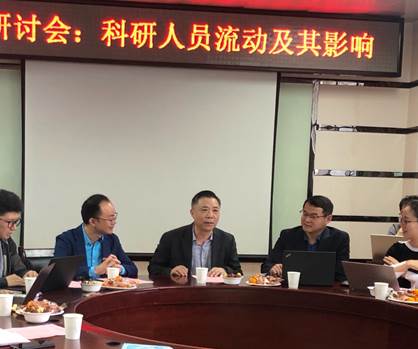
Professor Chuanfu Chen gives a welcome address.
Professor Chuanfu Chen pointed out that current scientific research had changed, which was more popular and connected closely with normal people's life. Open science provided more opportunities for the public to participate in scientific research, making research more transparent and provide more service to society. What was more important was to give the public more trust in academic researchers. To focus on the flow of researchers was to focus on the changes that this kind of flow would bring to research and the world, such as the transformation of research centers and research paradigms. Tracking and observing the flow of researchers was a great significance to national scientific planning, scientific cooperation and joint creation of scientific knowledge. On the other hand, promoting the exchange and mobility of researchers was actually an opportunity for researchers to broaden their horizons and change their behavior. It enabled researchers to experience different environments and understand different scientific methods and thinking patterns, which could help them to define research objectives and promote research progress.
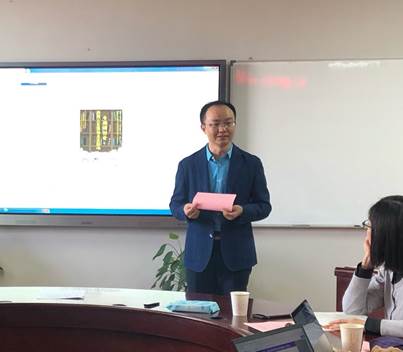
Professor Jiang Li hosts the first session of the seminar.
This seminar was composed by two sessions. The first session was hosted by Professor Jiang Li which mainly discussed the flow pattern and sociological characteristics of researchers. Professor Zhilei Shi at Zhongnan University of Economics and Law, first introduced his research results on the relationship between population flow and marital stability. His research mainly analyzed the relationship between the floating population nationwide and the divorce rate in different regions from cultural and regional factors, and his research reflected the influence of the culture of birthplace and the culture of working place on the marriage conception of floating population. Population flow belongs to the category of sociological research, but it provides a good reference for the research of researcher’s flow in the field of library and information science.
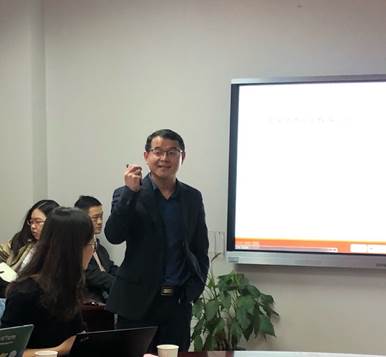
Professor Zhilei Shi introduces his latest research results.
Professor Jiang Li and two of his postgraduate students shared their work on the flow characteristics of academic researchers by utilizing ORCID data. The team found out that the movement of researchers between developed and developing countries could be concluded as five patterns. The flowing researchers are mainly concentrated in developed countries. Output and academic age are important factors in influencing the choice of employment country. From the perspective of gender, it can be found out that, there is a significant gender difference in the flowing of researchers on the whole. There is more mobility in their early career life, but no significant gender difference appearing in the choice of flowing periods. At the same time, there is no significant gender difference in the return of researchers from different countries.
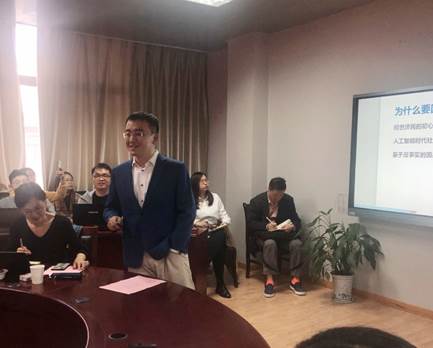
Special associate research fellow Dongbo Shi hosts the second session.
The second session of the seminar focused on causal reasoning in quantitative research and its similarities and differences with descriptive reasoning, which was hosted by special associate research fellow Dongbo Shi. Quantitative research methods mainly include descriptive reasoning and causal reasoning. The former utilizes observation value to derive conclusions that are difficult to observe directly, while the latter uses observation data to study causal effects, and neither is superior to the other. Current scientometrics research method is based on descriptive reasoning, which means that after revealing phenomenon, law and characteristic, the explanation of reasons is lacked. Therefore, more adoption of causal reasoning in scientometrics research will be an important way to expand the knowledge base and enhance the influence of disciplines.
Professor Zhi Luo at Economics and Management School, Wuhan University, introduced the selective bias and its correction based on counterfactual causal reasoning from the perspective of methodology. Professor Luo pointed out that the main purpose of econometrics application was to explain the relationship among variables, and causal reasoning was the core of applying econometrics research. Then, the causes of selective bias and its correction methods were analyzed with examples. The solution to the selective bias including controlling the ability of researchers, searching for instrumental variables and external impact factors, was proposed in combination with the topic of researcher flowing.
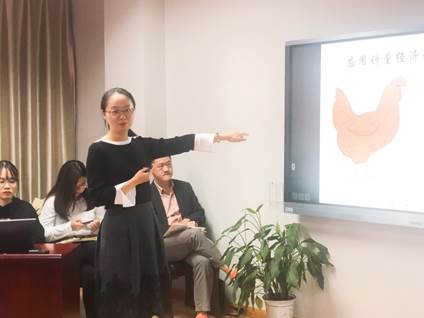
Professor Zhi Luo introduces selective bias and causal reasoning.
After that, WeiChen Liu and Zijiang Zhang, two students from the special associate research fellow Dongbo Shi team, introduced their research results respectively. Liu's study on the transnational flow and knowledge diffusion of young scientists found that the return of young scientists had a significant positive effect on the knowledge diffusion of their research results before and after their return. The phenomenon is even more pronounced among scientists in Chemistry and Earth and Environmental sciences. Zijiang Zhang specifically analyzed the flow characteristics of scientists from the Yangtze River scholars talent program in the eastern and western regions of China. It is found that the inclusion of the scientists in the Yangtze River scholars program significantly improved their mobility, and more people choose to move to the central, western and northeast China.
During the communication session, there was frequent interaction among teachers and students, they had a heated discussion on the influence of the flow of researchers and more issues that could be studied from the data. Via interdisciplinary communication and dialogue, we have gained much inspiration and harvest in terms of research field, question proposal, theoretical framework and research methods.
(This news in Chinese version was contributed by Yuan Yu, Journal Center of School of Information Management)